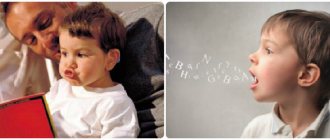Parent meeting “Child’s speech readiness for school.” Speech therapist's speech
Summary of a parent meeting in kindergarten on the topic “Speech readiness for school.”
Preparatory group The purpose of the speech: To attract the attention of parents to speech deficiencies in children, to reveal the impact of these deficiencies on academic performance, primarily in the Russian language and reading. Objectives: • 1) To acquaint parents with the concept of “speech readiness” and with the requirements of elementary school for the development of speech of first-graders. • 2) Consider the problems that may arise for students with low speech readiness. • 3) Determine the role of parents in the formation of students' oral and written speech. Every year we have to face a situation where a third of children entering first grade have various speech defects, which can subsequently have a negative impact on the development of writing and reading. Let's get acquainted with the main ones: Phonetic underdevelopment of speech is a defect that manifests itself especially clearly. This is a violation of the pronunciation of individual speech sounds or their groups. Normally, a child should speak all speech sounds correctly by age 5. If this does not happen, it is necessary to take urgent measures and teach the child to speak all sounds correctly before starting school. Defects in the sound aspect of speech may be accompanied by underdevelopment of phonemic perception - the specific auditory perception of speech sounds. This defect in a child is externally manifested in sound and syllable substitutions, but the degree of its severity and features in a given child can only be determined by a specialist. Phonemic underdevelopment leads to underdevelopment of writing and reading, the appearance of a number of specific errors, and poor academic performance. And the most alarming situation is when a future first-grader’s underdevelopment of the phonetic side of speech and phonemic perception is accompanied by an insufficient supply of knowledge about the world around him, poor vocabulary, underdevelopment of the grammatical side of speech (the ability to use words in various grammatical forms, correctly construct sentences), underdevelopment of coherent communication speech. This defect is called general speech underdevelopment. It affects not only the acquisition of literacy, but also the overall success of the child’s education at school. During the period of preparation for school, we recommend performing finger exercises with children, developing their memory and attention, teaching children retelling, the ability to see the main thing in surrounding objects and literary texts, the ability to correctly establish the sequence of events and talk about them. We also suggest that you attend speech therapy classes while there is still time. The duration of speech therapy sessions for each child depends on the severity and structure of speech underdevelopment. The success of correctional and educational work to overcome speech deficiencies presupposes the active participation of parents in it. It should not be assumed that the role of parents in the process of speech correction ends at the moment of contacting a specialist. No matter how good a speech therapist is, he will not be able to effectively help the child without the assistance of the parents. Only joint efforts will lead to good results. In order to correct a speech defect, persistent daily work is required, which should be carried out both in speech therapy classes and at home. During speech therapy classes, the child develops a short-term skill of correct speech, which must be controlled by the adults around the child and consolidated in various types of activities. The main task of parents in the process of correctional intervention is to actively interact with the speech therapist. Parents need to be interested in the progress and results of the correction process, seek advice from a specialist on any issues that arise, and conduct speech therapy exercises available at home. In addition, parents should remember that the speech of adults is a role model for the child, so it is important to communicate with the child in correct Russian. Every parent looks forward to the long-awaited and important moment when their beloved child goes to first grade. Entering school is an extremely important moment in a child's life. With the arrival of school, the child’s usual way of life changes - he moves into a new, previously unknown world. A preschooler becomes a schoolchild. The carelessness, carelessness and immersion in play characteristic of preschoolers are replaced by a life filled with many demands, responsibilities and restrictions. Now the child must go to school every day, work systematically and hard, follow a daily routine, obey various norms and rules of school life, fulfill the teacher’s requirements, do what is determined by the school curriculum in class, diligently do homework, achieve good results in studies. But has everything been done to ensure that the child is ready for school? Is his speech sufficiently developed? After all, his success in mastering absolutely all subjects of the school curriculum will depend on this! Let's define: • What is included in the concept of “speech readiness for school.” • What requirements does the elementary school impose on the first-grader’s speech and readiness to master literacy? • How can unformed knowledge and skills in the field of speech development affect the acquisition of subjects such as writing and reading. • How to help schoolchildren with low speech readiness overcome learning difficulties. To successfully master reading and writing, children must develop the following components of speech before starting school: 1. Children must be able to listen and hear others. If these skills are not developed, children may have difficulties in mastering the material presented orally by the teacher. 2. The sound side of speech - correctly pronounce all speech sounds; Correct pronunciation of speech sounds and clear distinction of speech sounds by ear are a prerequisite for mastering writing. — clearly and distinctly pronounce words and phrases with complex sound and syllabic content (for example: motorcyclist, traffic controller, thermometer); - speak loudly or quietly, or even in a whisper, depending on the situation; - change the pace of speech taking into account the content of the statement. As a rule, minor violations of the sound side of speech do not affect the success of further learning. Pronounced violations in this area lead to incorrect pronunciation being reflected in writing due to reliance on incorrect pronunciation. Writing is a reflection of oral speech. The child writes the way he speaks. Substitutions and omissions of letters may appear in the letter, corresponding to substitutions and omissions of sounds in oral speech (fur coat - “suba”, beetle - “zuk”, star - “zveda”, fish - “lyba”). Failure to master these skills can lead to intonation errors when reading. 3. Functions of language analysis. Children should be able to: - divide sentences into words; - divide words into syllables; - be able to identify all the sounds in words; - establish the sequence of sounds in a word. Underdevelopment of the functions of language analysis and synthesis manifests itself in writing in the distortion of the structure of words and sentences. The most typical errors are: - spelling words together, especially prepositions with other words; separate spelling of words, especially prefixes and roots (in the house - “in the house”, came - “on stepped”); - omissions, rearrangements, additions of syllables (room - "cat", cookies - "chepenie", steam locomotive - "pavoroz", grandmother - "grandmother"); - omissions of consonants when they come together; omission of vowels, addition of letters (pig - “grass”, grass - “tarawa”); - permutations of letters (room - “konmata”). 4. Lexical side of speech (vocabulary). Children should be able to: - choose words accurately; - clearly express your thoughts, connecting various facts into a single whole; - differentiate the designations of objects (for example: “passenger car and truck, and not just a car”, “winter and summer shoes”); - use complex words (for example: long-legged); - use epithets (for example: open field); - select metaphors (for example: a cloud of mosquitoes); - use words and phrases with a figurative meaning (for example: headlong); - select synonyms (for example: brave - courageous - courageous). Underdevelopment of the lexical side of speech affects reading comprehension, even with technically correct reading. Such children have difficulty understanding the meaning of words, sentences, and texts they read. Metaphors and comparisons are especially difficult. 5. The grammatical side of speech. Children should have developed inflection and word formation skills:
a) Inflection skills: Children should be able to: - change nouns by case and number (for example: sled, on a sled);
- use various prepositions; - agree nouns with adjectives in gender, number, case (for example: blue towel); - coordinate nouns with numerals (for example: one pencil, two, five pencils); - use verbs correctly (eg: run, run, runs, run, run, ran, will run, etc.). Due to the underdevelopment of the grammatical structure of speech, one can observe agrammatisms in writing and when reading, manifested in a distortion of the morphological structure of the word:
- errors in case endings and when changing the number of nouns (in Bory - “in Bory”, many trees - “many trees”, on a sled - “on a sled”);
- omissions, substitutions of prepositions (over the table - “on the table”, went to the forest - “went to the forest”); — coordination errors (white house - “white house”, “five cherries - “five cherries”, blue towel - “blue towel”). b) Word formation skills: Children should be able to: - form words using diminutive and magnifying suffixes (for example: eyes - eyes - eyes); - form verbs using prefixes (for example: walked - went out - crossed - walked around); - form the name of baby animals; - form relative and possessive adjectives from nouns (for example: raspberry - raspberry, fox - fox). If a first-grader has not developed word-formation skills, then when writing the following may be observed: - substitutions of suffixes (kids - “little goats”); — replacement of consoles (overwhelmed - “overwhelmed”). There may be difficulties in constructing complex sentences, omissions of sentence members, and violations of the sequence of words in a sentence. Independent written speech may be impaired. 6. Coherent speech. Coherent speech is usually understood as such expanded (that is, consisting of several or many sentences) statements that allow a person to systematically and consistently express his thoughts. Children should be able to:
- communicate freely with adults and peers; - maintain a conversation on age-appropriate topics; - talk about the events experienced; - retell the content of a fairy tale or story; - describe surrounding objects; - reveal the content of the picture, some phenomena of the surrounding reality. Violation of independent coherent speech can be expressed in difficulties in retelling, in composing a story, in writing essays and presentations. Thus, the well-developed speech of a first-grader serves as a means of successful learning not only in writing and reading, but in other subjects at school. The above-mentioned features of the oral speech of future first-graders with disabilities indicate that without targeted speech therapy work to correct deficiencies in the development of all components of speech, children will find it difficult to master the school curriculum in the Russian language, and they may develop a negative attitude towards learning.
We recommend watching:
Scenario of a parent meeting in a preparatory group for school Parent meeting in a preparatory group Parent workshop meeting in a preparatory group Final parent meeting in a preparatory group. Abstract
Similar articles:
Topics for parent meetings in the preparatory group for the Federal State Educational Standard for the year
First parent meeting in the preparatory group in September
Parent meeting in the preparatory group: Child’s readiness for school
KVN parent meeting in the preparatory group
Parent meeting in the preparatory group. Child's rights
MAGAZINE Preschooler.RF
Speech at a parent meeting Topic: “Peculiarities of enrollment and training of kindergarten students in need of speech therapy assistance.”- Speech therapist teacher Irina Nikolaevna Prosyanaya
- Senior teacher Guptor Irina Sergeevna
MDOU "General developmental kindergarten No. 29, Krasny Oktyabr"
Date: August.
Purpose: to introduce parents (legal representatives) to the kindergarten speech therapist, speech disorders and the peculiarities of enrolling children in speech therapy classes.
Event plan:
- Regulatory documents of kindergarten.
- Who is a “speech therapist” ?
- Features of the organization of speech therapy work in kindergarten.
- The role of the family in overcoming speech disorders in children.
Content
Senior teacher: Good evening, dear parents! We receive many questions from parents about how to get to correctional classes with a speech therapist in kindergarten. To do this, we would like to introduce you to the Regulations on the Logopunkt of our kindergarten.
To provide speech therapy assistance to pupils with speech disorders, there is a speech therapy center in the kindergarten. Before staffing the speech center for the next school year (late February – early March), on the basis of the written consent of parents (legal representatives), the speech therapist teacher conducts a speech therapy examination of students to identify children with disorders in the development of oral speech. Parents are familiarized with the results of the examination and it is recommended to undergo the TMPK; if the parents agree, they are given the appropriate documents to pass the commission; in case of disagreement, parents (legal representatives) have the right to write a refusal to undergo the TMPK in writing.
The conclusion provided to the kindergarten by parents (legal representatives) after passing the TMPK is the basis for the creation of special educational conditions, including conditions for the correction of speech disorders.
First of all, children of the senior and preparatory groups, as well as younger children with complex speech disorders, are admitted to the Logopunkt.
Our speech therapist teacher will tell you in more detail about speech disorders.
Speech therapist teacher: Hello, dear parents! Let us understand what “speech therapy” - this is the science of speech disorders, their correction through special training and education. The term “speech therapy” is derived from the Greek words “logos” (speech, word), “peideo” (educate, teach), which translated means “speech education . Accordingly, a specialist involved in speech correction (or “speech education” ) is called a speech therapist.
As already mentioned, children are enrolled in speech therapy classes only if they have a TMPK conclusion.
Which children receive speech therapy classes? These are children who have problems with speech development. Based on the results of the TMPK, our students may have the following ONR or FFNR conclusions.
What kind of violations are these?
OSD is a speech disorder in which the formation of various components of speech is disrupted in children: sound pronunciation, phonemic perception, syllable structure of words, vocabulary, grammatical structure, coherent speech.
FFND is a speech disorder in which sound pronunciation and phonemic perception are impaired.
What is the work of a speech therapist at a speech center? At the speech therapy center, specialized work with children is carried out in the following areas:
- development of articulatory movements - these are movements of the speech organs (lips, cheeks, tongue);
- formation of correct sound pronunciation
- improvement of phonemic processes, i.e. ability to distinguish by ear the sounds of speech, syllables, words in speech that are similar in sound, articulation
- development of the syllabic structure of a word
- improving the grammatical structure of speech
- enrichment, activation of speech vocabulary
- development of coherent speech, which implies the ability to compose stories, retell texts, recite poems, riddles, proverbs;
- improvement of the prosodic side of speech, including the development of diction, expressiveness of speech, proper breathing, work on correct stress, tempo of speech
— development of fine motor skills of the hands, i.e. movements of the fingers (scientists have proven that the development of small movements of the fingers is interconnected with the development of the speech areas of the brain).
All of the above work is carried out at the logo center in the form of subgroup classes and individual work.
4. What is the role of the family and parents in overcoming speech disorders in children?
Don’t think that speech defects will disappear on their own over time. To overcome them, systematic, long-term correctional work is necessary, in which parents play a significant role, since the child spends more time at home with people close to him. Parents should form the correct attitude towards a child’s speech disorder: unobtrusively correct incorrect pronunciation; to ensure that the child has a positive attitude towards classes with teachers.
Parents should pay special attention to following the recommendations received from specialists. The speech therapist writes down tips and recommendations on an individual basis. Parents should monitor the correctness of their own speech. Speech must be clear, clear, competent, and expressive. At home, read poems, fairy tales, riddles, and sing songs more often. Play with your child, establish verbal and emotional contact.
I would like to note that only in close cooperation between family and teachers can good, high-quality and relatively quick results be achieved in the correction and development of a child’s speech. Continuity in the work of the family and kindergarten is carried out through individual consultations, parent meetings, and visual information for parents.
| Next > |


